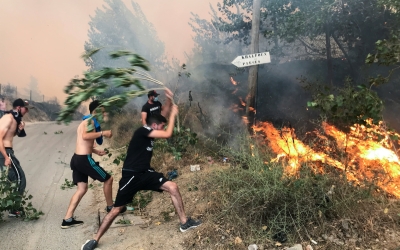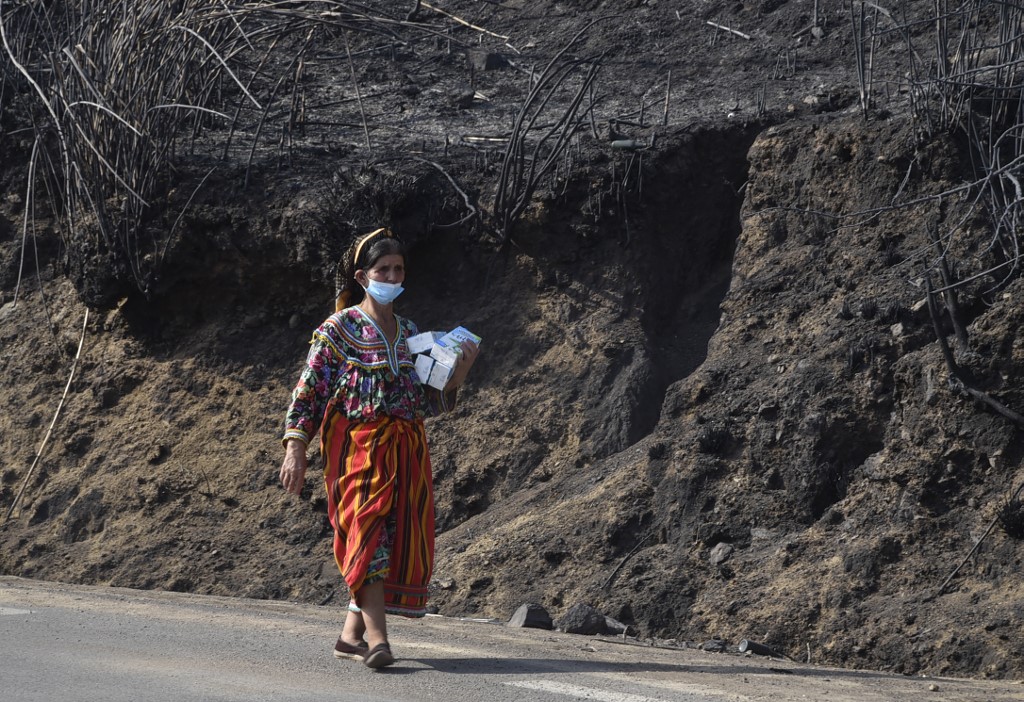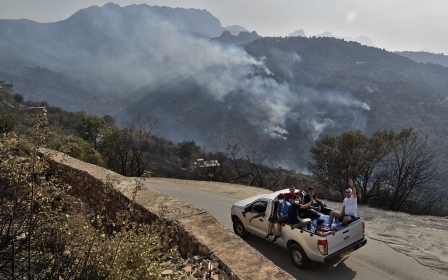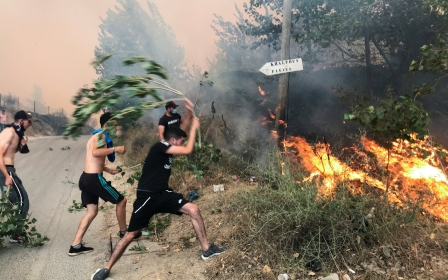Algeria: Devastated villages and charred farmland left in wake of Kabylie wildfires
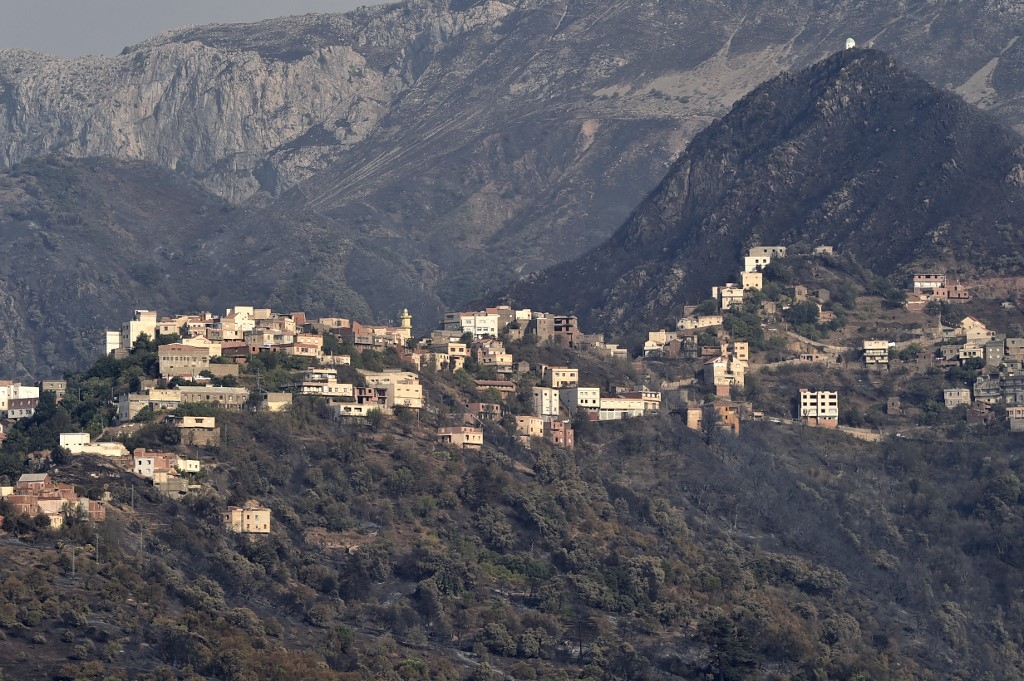
More than a month after deadly fires claimed 90 lives in the Kabylie region of Algeria, mourners have travelled to the tiny village of Agoulmime, more than 1,000 metres above sea level in Tizi Ouzou's Larbaa Nath Irathen district, to visit the graves of the dead and show their solidarity and sympathy with grieving villagers.
Agoulmime buried around 20 of its villagers. Dozens more remain in hospital.
"People are still coming here from Constantine, Annaba, Algiers, Setif, Ghardaia and elsewhere to pray at the graves of those who died trying to flee the flames that encircled the village. Most who died were with their families, burned to death or asphyxiated," Mouloud, a member of the hillside village committee, told Middle East Eye.
So many lives were lost that a new cemetery, over which the national flag flies, was designated for the victims, in front of the village spring.
"A monument will be erected in their memory soon," says Said, a 60-year-old villager. He still comes to talk to his family and friends every day, as he did when they were alive.
Said told MEE that he would like to leave the area, not only to have a fresh start, but also because his family's olive grove was destroyed by the flames.
"When I go home in the evening, I can't sleep. I relive the scenes of people burning, ambulances, flames advancing mercilessly. I hear the cries, I go to the kitchen and chain-smoke cigarettes and drink coffee," he said.
"I cultivated the olive grove with my parents, who are no longer alive. Now, I've lost between 200 and 250 trees, which had a yearly yield of between 1,200 and 1,800 litres of olive oil - that's a revenue of around 700,000 dinars per year ($5,087) - and around 30 fig trees. Around here, everyone makes their living from olive trees, including the poorest," he added.
'My olive grove was completely destroyed'
For the time being, Said takes strength from the other survivors who have come together to form a committee to support each other, to coordinate information on those still in hospital and to collect and distribute donations.
Among them is Mohamed. Outwardly strong and hearty, he lost his wife and two daughters. Now the immediate family is just Mohamed and his 14-year-old son, who is still in hospital with fourth-degree burns.
"The dead are dead," he said. "All I pray for now is that my son survives."
Since the tragedy, Mohamed, who left a job in the public sector five years ago to work in agriculture and livestock farming, no longer has the will or spirit to go back to work.
"My wife worked with me, milking the cows and processing the milk… Now, she's not with us any more. My barn was destroyed in the fire and my olive grove of 250 trees has been destroyed," he added.
"We've received food donations, more than we need," said Mouloud, a village committee member. "Also important was the solidarity in terms of psychological support given by the associations that accompany the sick and organise activities for the children. We've set up a fund for purchasing medicine," he added, "and paying for transport and the costs of carers and their meals."
The committee wanted to coordinate donations to buy special dressings for burns, which cost around 100,000 dinars ($725), while full-body dressing for patients with extensive burns cost between $2,300 and $3,470 and must be replaced every three months.
"The long-term treatment of survivors is very expensive. We have to be prepared for it," Mouloud stressed. "We also have to think about treating people who have suffered from burns and who are unable to go back to work."
'There are day labourers and manual workers without insurance, plumbers, decorators... who now have burned hands. What are they to do?'
- Said, Village committee member
Said continued: "There are people who've had skin grafts, others who are bed-bound. There are day labourers, manual workers without insurance, or plumbers, decorators, farmers and plasterers, who now have burned hands. What are they to do? There are also the widows of workers who don't get any pension or payment. There needs to be aid in place for them until these people recover, bearing in mind that for burns victims, recovery can take several years."
Ouacif takes its name from the river that runs through it. "Almost the entire area is affected", said Amirouche, a forestry worker. "The town of Ouacif is 100 percent agricultural," he told MEE.
Lack of local raw materials halts work
"The village of Ait Toudert is the worst affected," Amirouche said. "Several chicken coops were consumed by the fires, and three olive groves. In Ait Bouhaidi, between five and 10 chicken coops and some olive trees were ravaged. This has had a particular impact on farming and distribution, as well as on the large retailers of beehives."
According to initial calculations in the district of Tizi Ouzou, the fires - the most dramatic in Algeria's recent history - consumed more than 25,000 hectares of forest, including 4,610 hectares of olive groves and 700 hectares of fruit trees, killing 100,800 farm animals and damaging 4,470 farm buildings.
Economist Brahim Guendouzi, professor at Hasnaoua University in Tizi Ouzou, says this destruction of arboreal heritage, particularly the olive and fig trees, along with the broader loss of flora and fauna, has not only affected businesses but also employment. In regions such as Ouacif, "many processing plants such as oil mills, dairies and other agribusiness activities are now mostly at a standstill, due to the absence of local raw materials," he noted. "This has a knock-on effect on jobs."
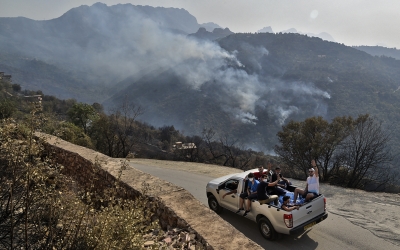
Now autumn is here, the region has another urgent situation: the reconstruction of the 2,028 houses destroyed or damaged by the flames.
In Ouacif - a town famed for its handicrafts, producing sieves and saddles for horses and donkeys - houses remain habitable, albeit damaged. But in Ait Douala, Hocine stands bereft in front of the remains of his home and the burnt-out wreckage of kitchen appliances; his chicken coop gone, the haystack and some 60 olive trees burnt to the ground.
He has nothing left but a room where he takes refuge with his wife, who is bed-bound after illnesses and operations on both legs.
Retired, the 76-year-old explained that the pension he receives is enough for him to live with his wife. Three of their children have left the country and migrated illegally, while two live far away. As winter approaches, particularly brutal at 750 metres altitude, Hocine prays that someone will help him rebuild his home so the couple can make it through the winter.
Mohamed, along with his neighbour in the small town of Taguemount Oukerrouche, is still coming to terms with what he has lost. He lives alone in a house severely damaged by the fires. The fragile balconies, scorched by the flames, overlook hectares of the charred remains of fruit trees.
At the age of 73, having retired from a textile company, Mohamed turned his hand to beekeeping, sheep farming, and growing trees, vegetables and plants. He had to watch his two ewes trapped in a circle of flames, and the fire burning "like a blowtorch", destroying years of his work.
"Just when everyone was fleeing the surging flames, my two ewes panicked and went back to their usual spot, where the flames surrounded them. My fig, almond, apple, olive, pear, apricot and nectarine trees, along with my crops of onions and other root vegetables and my 32 beehives, were burnt to a crisp," he said.
This damage to housing, harvests, food reserves and livestock will, according to the economist Guendouzi, undoubtedly leave the local economy in tatters, "both for households that have lost their assets, businesses and incomes, and for regional authorities which will have new costs to face at a time when most of them are already short on funds".
Farming decimated
"In the affected areas, livestock farming, particularly cattle and goats - predominantly for milk production - poultry farming and beekeeping have been decimated," Guendouzi added. "People living in these regions always eagerly await the olive harvest. This is a business that often involves great efforts from the whole family, particularly from rural women. This village and family dynamic has suddenly come under threat."
Mohamed estimates his losses at two million dinars (around $14,500). He refuses to give up, however, and has been working for the past month to save "what can be saved". He does not hide his gratitude to the person who gifted him 15 trees.
Amar, a 53-year-old deaf-mute man, seems for the moment to be among the more fortunate of the survivors: his home is about to be renovated. An unemployed father of two, he saw the flames gradually consume his house.
"Support has come from every region of the country. I even saw registration plates from Adrar [in the far south of Algeria]. Everyone offered material, financial or moral support," says Akli, Amar's cousin and neighbour. "This house, which was two rooms before the fire, has been rebuilt with four rooms, bathroom, toilet, kitchen and terrace."
Standing on his new terrace, Amar smiles at everyone who goes by. He doesn't know the innumerable people who file in and out of his home. He just knows they are there to help him and that his house is much bigger and better than it was before.
A short distance away, 40-year-old Khiser had watched helplessly in the village of Ichardiouene as his timber-framed family home burst into flames, along with the garage which housed six vehicles. He is still coming to terms with the fact that, in the space of mere minutes, he and his brother lost their entire family's source of income, including vans they used to distribute beverages. Devastated, he showed MEE the burnt-out chassis of the four cars and two vans.
"The engines exploding were like six bombs going off. The garage and the timber frame of the upper level of the house exploded," he said, looking out over the devastated fields of olive, apple and cherry trees.
"Our business fed two families of 14 people," he told MEE. "This is a living nightmare. I still find it difficult to believe that my life's investment went up in smoke in 15 minutes. But life goes on. May God give us the courage to carry on."
This article is an edited translation of a story originally published on Middle East Eye's French website.
Middle East Eye delivers independent and unrivalled coverage and analysis of the Middle East, North Africa and beyond. To learn more about republishing this content and the associated fees, please fill out this form. More about MEE can be found here.


